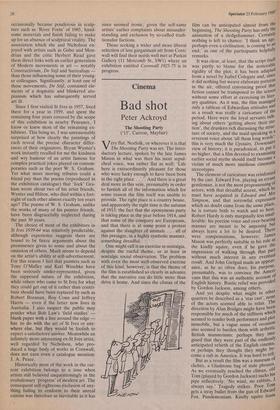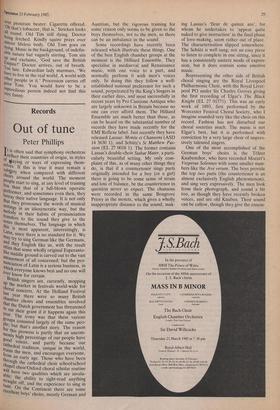Cinema
Bad shot
Peter Ackroyd
The Shooting Party ('15' , Curzon, Mayfair) Very flat, Norfolk, or wherever it is that The Shooting Party was set. The intro- ductory lecture, spoken by the late James Mason in what was then his most sepul- chral voice, was rather flat as well: 'Life here is extraordinarily pleasant for those who were lucky enough to have been born in the right place . . .'. And there is a great deal more in this vein, presumably in order to furnish all of the information which for some reason the film itself was unable to provide. The right place is a country house, and apparently the right time is the autumn of 1913: the fact that the eponymous party is taking place in the year before 1914, and that some of the company are Europeans, and that there is at some point a protest against the slaughter of animals . . . all of this presages, in a highly symbolic manner, something dreadful.
. One might call it an exercise in nostalgia, despite the rueful theme, or at least in nostalgic social observation. The problem with even the most well-observed exercise of this kind, however, is that the theme of the film is established so clearly in advance that the narrative can do little more than drive it home. And since the climax of the film can be anticipated almost from the beginning, The Shooting Party has only the animation of a sledgehammer. CertainlY nothing is left to chance: 'I think an age, perhaps even a civilisation, is coming to all end,' as one of the participants helpfullY remarks. It was clear, at least, that the script itself was partly to blame for the noticeable rigidity of the plot; it has been adapted from a novel by Isabel Colegate and, since it did nothing but weave elaborate patterns in the air, offered convincing proof that fiction cannot be transposed to the screen without some effort at exorcising its liter- ary qualities. As it was, the film managed only a tableau of Edwardian attitudes and as a result was really a caricature of the period. Here were the loyal servants talk- ing about others 'getting above their sta- tion', the drunken rich discussing the struc- ture of society, and the maid speaking in 3 reverent voice about 'all them long words this is very much the Upstairs, Downstairs view of history; it is paradoxical, to put it no higher, that a film devoted to examining earlier social myths should itself become victim of much more insidious cinematic stereotypes. The element of caricature was reinforced by the cast. Edward Fox, playing an errant gentleman, is not the most prepossessing of actors; with that dreadful accent, which he must have acquired in Edward and Mrs Simpson, and that sorrowful expression which no doubt came from the same place' he is torture both to watch and to he Robert Hardy is only marginally less insuf- ferable: his porcine voice and over-bearing manner are meant to be imposing but always leave a lot to be desired. There were compensations, however; James Mason was perfectly suitable in his role as the kindly squire, even if he gave the impression of walking through that Part without much interest in any eventual result. And John Gielgud made an appear- ance, as he so often does; his purpose,' presumably, was to convince the Ameri- cans that this was an authentic account of English history. Rustic relief was provided by Gordon Jackson, among others. And yet despite what might in other quarters be described as a 'star cast', none of the actors seemed able to relax. The direction by Alan Bridges might have been responsible for much of the stiffness which seemed to render both performers and plot immobile, but a vague sense of occasion also seemed to burden them with arthritic British mannerisms: perhaps they ima- gined that they were part of the endlessly anticipated rebirth of the English cinema, or perhaps they thought they might be- come a cult in America. It was hard to tell. But as a result the film was a museum of clichés, a Gladstone bag of stale phrases. As we eventually reached the climax, old Tom (played by Gordon Jackson) sucks his pipe reflectively: 'No wind, no rabbits, I always say.' Tragedy strikes. Poor Toni gets a stray bullet from the gun of Edward Fox. Pandemonium. Kindly squire leans over prostrate beater. Cigarette offered. Oh that's tobaccer, that is.' Stricken looks . all round. Old Tim still dying. Doctor being fetched. Kindly squire prays over almost lifeless body. Old Tom goes on dying. Music in the background, of indefin- able nature but vaguely stirring. Tom sits uP and exclaims, 'God save the British Empire!' Doctor arrives, out of breath. Too late. Edwardian lady murmurs, 'We have to live in the real world. A world with other people in it.' Procession carries off Poor Tom. You would have to be . a supercilious person indeed not find this very funny.











































 Previous page
Previous page